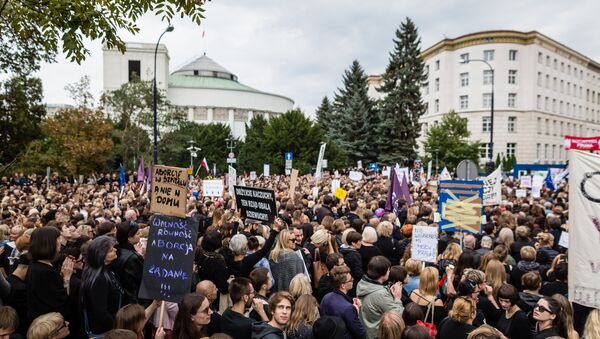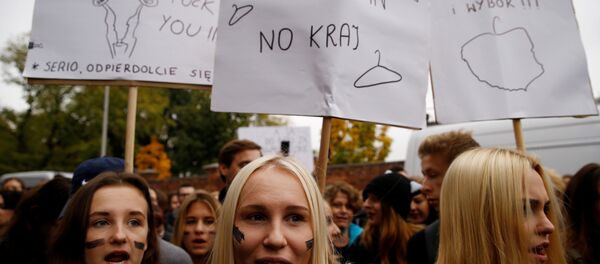“Then we returned to the Skwer Kościuszki and waited for 15:00, when the main march was due to take place. People kept pouring in,” Agatha said.
When the march began Agatha recalls that the, “Drivers kept honking at us, people waved from their balconies in support, so we felt that what we were doing was important.”
Most of the Poles were dressed in black and due to their march through city streets, government offices, restaurants and other businesses were closed.
"Police reported about 143 manifestations on Monday, which were attended by some 98,000 people," Jaroslaw Szymczyk said, as quoted by the Polish Wiadomosci newspaper.
The official said that the largest rally was held in the western Polish city of Wroclaw and was attended by some 20,000, while the rally in the country's capital gathered around 17,000 people.
Talking about the most popular slogans seen during the protest, Agatha said, “The most popular were, ‘My uterus, my choice.’ There were many different ones. In some the words rhymed in some they didn’t. There were funny ones like ‘PiS OFF’ or ‘PiS of Shit’ [in reference to the name of the ruling Prawo I Sprawiedliwość – PiS party].”
Agatha spoke about the reaction of the Polish government or media to the protests, saying that there was something about it in the media as there were many cameras, photographers etc. covering the protest. However, the response from the government was “mediocre.”
“We stood in front of the city’s administration building but the mayor did not come out to us. It was kind of sad,” Agatha said.
Regarding protests held in the neighboring towns of Sopot and Gdansk, Agatha said that over there girls had been out in the streets since 9 a.m.
6 million women expected to be on strike in Poland today to protest dangerous new abortion law. #czarnyponiedziałek https://t.co/38WQ5GbaoM pic.twitter.com/COylKzC0w6
— Andrew Stroehlein (@astroehlein) October 3, 2016
However, looking at the town of Gdynia, Agatha said the march was really successful because no one expected that such a number of people would show up.
“There were mothers with young children in strollers, mothers in law, grandmothers, and aunts. You can say it was a family atmosphere. I even met my uncle, so we protested together. We are happy because we have come here for a common goal, to fight for our choice,” Agatha concluded.
The ruling Law and Justice [Prawo I Sprawiedliwość – PiS] party has put forward the proposal — from a group called Ordo Iuris — for debate in parliament. Critics of the new rules say PiS may back them for fear of angering the church in steadfastly Roman Catholic Poland.
Poland's already restrictive laws only allow abortion in the case of rape, incest, a threat to a pregnant woman's health, or when the baby is probably going to be permanently handicapped.
Women and doctors could face jail if convicted of causing what the proposed rules call “death of a conceived child,” and critics say doctors would be discouraged from doing prenatal testing, particularly if that carried the risk of miscarriage.
Protests against putting a ban on abortion took place in London, Edinburgh, Brussels and Berlin to name just a few; with some estimates suggesting that up to six million women could be taking part within Poland.
The bill which would bring about the change in law is currently at the Committee stage in the Polish Parliament, no government officials have yet commented on whether it will be revised.



